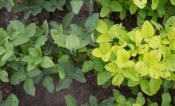
Light green plants save nitrogen without sacrificing photosynthetic efficiency
RIPE scientists designed plants with light green leaves to allow more light to penetrate the crop canopy to increase light-use efficiency and yield.
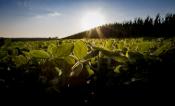
Hacking evolution, screening technique may improve most widespread enzyme
Scientists have developed tools to simulate millions of years of evolution in days to help plants adapt to changing conditions.
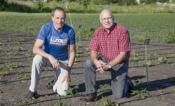
The time is RIPE to transform agriculture and feed the world
University of Illinois receives grant from the Bill & Melinda Gates Foundation, FFAR, and DFID to catalyze photosynthetic improvements, increase yields for farmers worldwide
Cowpea protected from a devastating pest, free for smallholder African farmers
Researchers have engineered cowpea—one of the most important sources of vegetable protein for rural families in sub-Saharan Africa—to produce the Bacillus thuringiensis (Bt) protein.
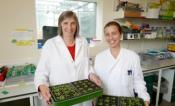
Incremental discovery may one day lead to photosynthetic breakthrough
While we have modeled the more-than-100 major steps of photosynthesis, scientists are still discovering the purpose of proteins that can be engineered to increase yield. RIPE has uncovered secrets about another protein, CP12—the full understanding of which may provide an additional route to boost yields in the future.
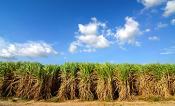
New 3D model predicts best planting practices for farmers
As farmers survey their fields this summer, several questions come to mind: How many plants germinated per acre? How does altering row spacing affect my yields? Does it make a difference if I plant my rows north to south or east to west? Now a computer model can answer these questions by comparing billions of virtual fields with different planting densities, row spacings, and orientations.

Mark your calendar for the 2017 Food & Fuel Field Day
Media, industry, and policymakers are invited to see the plants that could help feed and fuel the world by 2050 and meet the scientists who engineered them at the 2017 Food & Fool Field Day on Thursday, July 13, at the University of Illinois Energy Farm.

RIPE’s Susanne von Caemmerer elected fellow of the Royal Society
Plant scientist Professor Susanne von Caemmerer from The Australian National University (ANU) has been elected a Fellow of the Royal Society in the UK, the longest standing scientific academy in the world.

RIPE Deputy Director elected to the National Academy of Sciences
RIPE Associate Director Donald Ort is among four University of Illinois professors elected to the National Academy of Sciences this year.
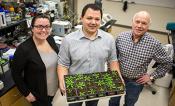
Newly characterized protein has potential to save U.S. farmers millions annually
Instead of turning carbon into food, many plants accidentally make a plant-toxic compound during photosynthesis that is recycled through a process called photorespiration. University of Illinois and USDA/ ARS researchers report in Plant Cell the discovery of a key protein in this process, which they hope to manipulate to increase plant productivity.
